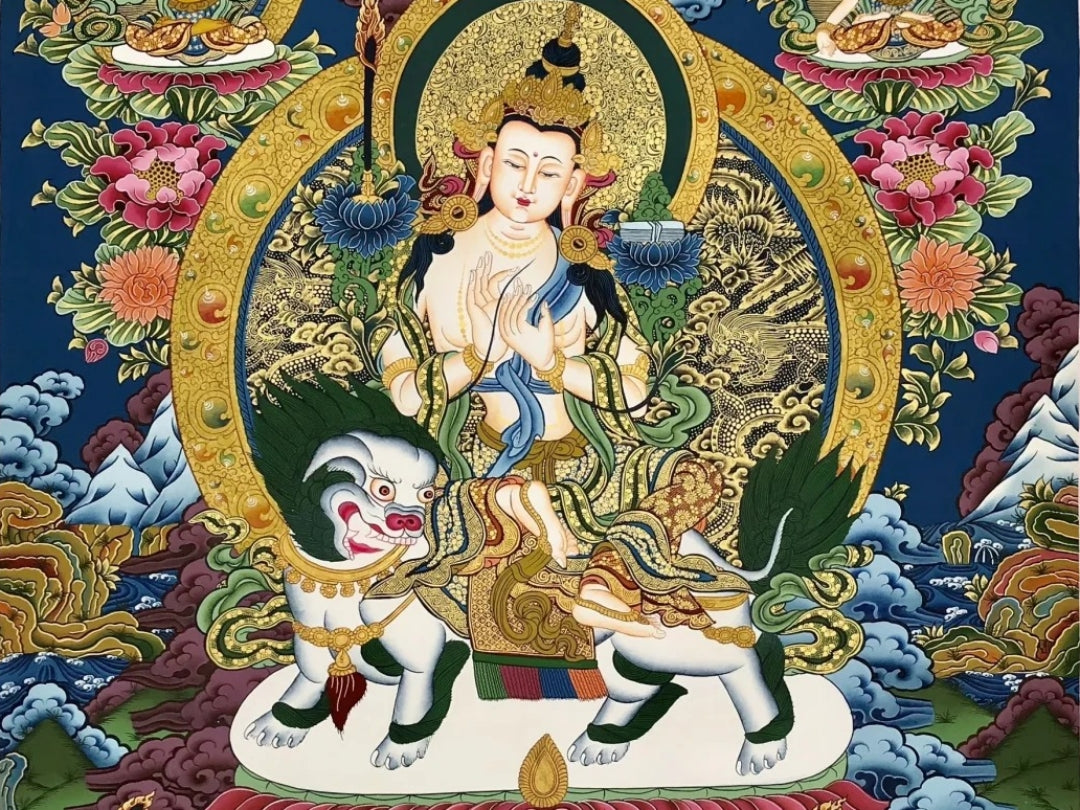In Buddhist tradition, The Fifth Lord (五爷), also known as Guangji Dragon King Bodhisattva (广济龙王菩萨), holds a revered place as a deity of wealth. Said to be the fifth son of the Dragon King, his birth name was Shengyan (圣衍). Known for his ability to grant financial prosperity and fulfill the wishes of devotees, The Fifth Lord is affectionately called the “Dragon King of Wealth” (龙五爷财神).

The Fifth Lord’s Influence at Mount Wutai and His Sacred Temple
Mount Wutai, located in Shanxi Province, is regarded as a Buddhist sacred land, home to many historic temples. Among these, the Fifth Lord Temple (五爷庙) is one of the most famous, known for its powerful ability to grant wishes. This temple enshrines The Fifth Lord, alongside other revered Dragon Kings, who are deeply respected for their compassion and miraculous powers. Devotees come from far and wide to offer prayers, believing that their sincere petitions to The Fifth Lord will bring blessings of wealth and fortune.

The legends around The Fifth Lord portray him as a figure of great kindness, wisdom, and strength. Originally believed to have a fierce temperament, his face was once depicted as black. However, it is said that through Buddhist teachings, his nature softened, and his visage transformed to gold, symbolizing his gentler, compassionate side. Today, the golden-faced Fifth Lord is cherished by both Buddhists and laypeople, especially those seeking financial stability and prosperity.
Guardian of Prosperity and the People’s Protector
The origin of The Fifth Lord's benevolent power dates back to when Mount Wutai was a hot, inhospitable place. According to legend, Bodhisattva Manjushri (文殊菩萨) brought a magical cooling stone from the East Sea Dragon King to make the region pleasant for all who visited. This stone originally belonged to the Dragon King's five sons, who controlled the rains and clouds. Upon discovering that Manjushri had borrowed their treasure, they followed him to Mount Wutai, causing great chaos until Manjushri subdued them and assigned each to a different peak to protect the region.
The Fifth Lord, positioned on the northern peak, was charged with overseeing the area’s climate, bringing favorable weather and a good harvest. His role expanded beyond controlling the elements; he became a guardian of wealth, easing suffering and promoting well-being. Recognizing his compassion and dedication, Buddha himself bestowed upon him the authority over human wealth and fortune distribution.

Worshipping The Fifth Lord: Tradition and Blessings
To this day, people honor The Fifth Lord for his ability to grant wishes. Every year around the 13th day of the fifth lunar month, worshippers gather at the Fifth Lord Temple to pray for prosperity and good fortune. Whether a devout Buddhist or a layperson, all are welcome to receive the Fifth Lord’s blessings, as he is believed to answer sincere requests with compassion.
It is common to chant traditional prayers such as "Namo Guangji Dragon King Bodhisattva, Om Ah Hum" (南無廣濟龍王菩薩,嗡啊吽) in reverence. Worshippers hope to receive wealth tokens such as gold ingots, treasure bowls, or simply the goodwill that brings prosperity. While wealth may not arrive immediately, devotees believe that gradually, through worship and good deeds, both honest earnings and unexpected fortunes may come their way—a testament to The Fifth Lord’s mystical powers.

Extending Influence: The Fifth Lord in the South Sea
Another temple dedicated to The Fifth Lord lies in the South Sea (南海), where a rich tradition surrounds his legacy as a compassionate benefactor. It is said that Avalokitesvara Bodhisattva (观世音菩萨), who vowed to save all beings, once encountered the people of the South Sea plagued by disease and hardship. The Fifth Lord, recognizing Avalokitesvara’s wish to protect humanity, offered to support her in traversing the waters to bring aid to the suffering. Under The Fifth Lord’s guardianship, Avalokitesvara was able to restore peace and well-being to the South Sea, ridding the area of disease and blessing it with prosperity.
Grateful for his devotion, Buddha awarded The Fifth Lord three precious treasures for wealth: the "Gold Ingot" (金元宝), "Wealth Treasury" (财源库), and "Treasure Bowl" (聚宝盆), which he uses to manage the flow of wealth throughout the human world. Due to his influence, the South Sea region prospered and became known as a wellspring of wealth for all of China.
Honoring The Fifth Lord (五爷) for Prosperity
The enduring legend of The Fifth Lord as a deity of wealth resonates deeply with those who seek spiritual guidance and prosperity. As the guardian of Thangka jewelry traditions and Buddhist culture, The Fifth Lord’s blessings are believed to extend beyond monetary wealth, inspiring generosity, compassion, and spiritual abundance.

Today, both in Mount Wutai and the South Sea, temples devoted to The Fifth Lord remain among the most spiritually powerful and cherished places of worship. Whether through offering incense, donating to his temple, or simply reflecting on his compassionate legacy, followers feel that by honoring The Fifth Lord, they are cultivating good fortune, health, and a harmonious life.



